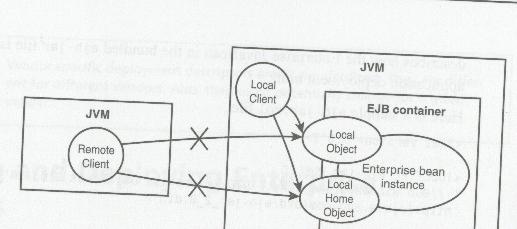Remote Interfaces
Client is remote
accesses EJB through the bean's remote interface and remote home interface.
- remote interface extends javax.ejb.EJBObject
- remote home interface extends javax.ejb.EJBHome
- all methods in EJB interface and EJB home interface must throw RemoteException as they are remote objects (invoked remotely by remote client).
- all method return types and argumetns in EJB and EJB interfaces must be only vaild RMI types like primitives, serializable objects and RMI/IIOP remote objects.
note: EJB uses Java RMI (Remote Method Invocation) over IIOP as the communication protocol.
Example Home Interface
public interface EnrollmentCartHome extends EJBHome {
EnrollmentCart create() throws CreateException, RemoteException;
}
Example Component Interface
public interface EnrollmentCart extends EJBObject {
public void addCourses(String[] courseIDs) throws RemoteException;
public Collection getCourses() throws RemoteException;
public void emptly() throws RemoteException;
}Example EJB class
public class EnrollmentCartEJB implements javax.ejb.SessionBean {
private SessionContect ctx;
private HashSet cart;/* callback methods*/
public void setSessionContext(SessionContext ctx) { this.ctx = ctx; }public void ejbCreate() throws CreateException {
cart = new HashSet();public void ejbActivate() {}
public void ejbPassivate() {}
public void ejbRemove() {}/*business methods*/
public void addCourses(String[] courseIds) {
if(courseIds == null) { return; }for (int i=0; i<courseIDs.length; i++) {
cart.add(courseIds[i]); }
}public Collection getCourses() { return cart; }
public void empty() {cart.clear(); }
}
Local Interfaces

Client is remote
accesses EJB through the bean's local interface and localhome interface.
- component interface extends javax.ejb.EJBLocalObject
- local home interface extends javax.ejb.EJBLocalHome
- requires client and EJB on same physical machine using same JVM..
- advantage: less network traffic, RMI call is expensive (involves stubs and skeletons marshalling and unmarshalling the call parameters, etc.).